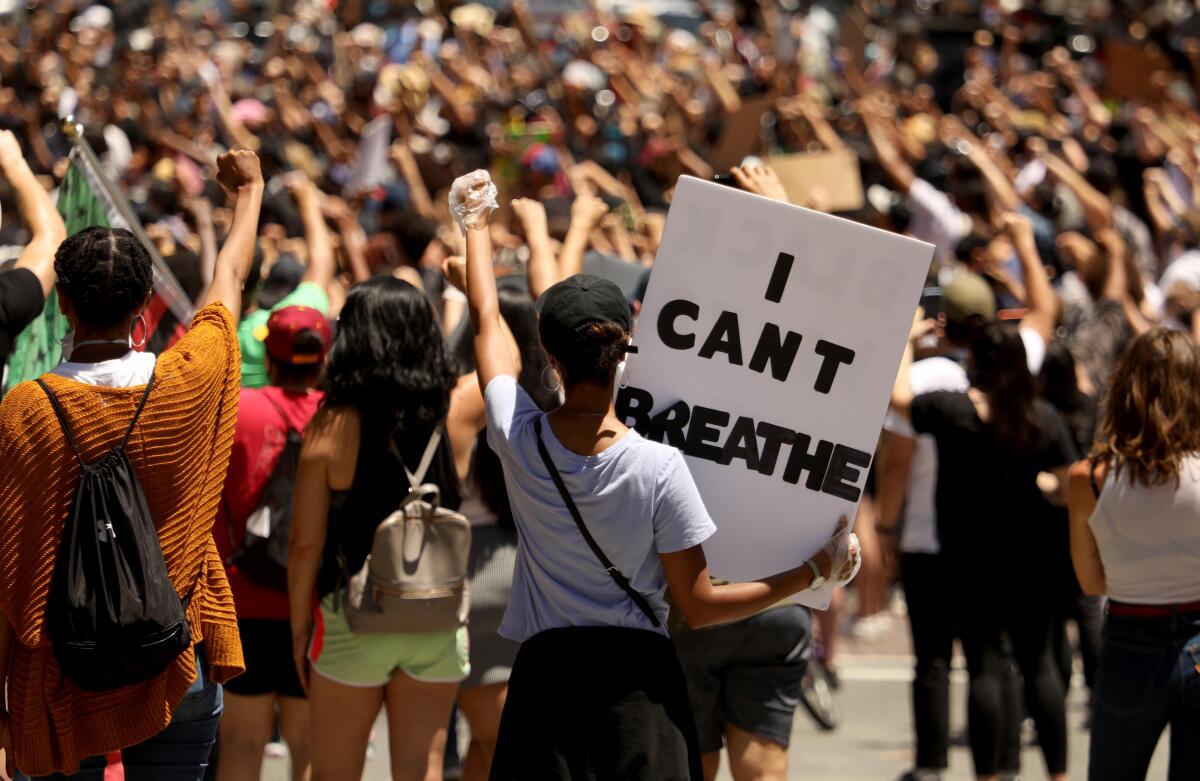Brands under pressure to make a stand on racism

- Share via
Brands are facing growing pressure to speak out about racism as surveys show that the killing of George Floyd has prompted a sharp shift in U.S. consumer attitudes about a subject many marketers had long sought to avoid.
Some 60% of Americans would now boycott or buy from a brand based on its response to Floyd’s killing, according to a poll released on Tuesday by Edelman, a public relations consulting firm.
The young, diverse and high-spending consumers who companies most covet are leading the shift, with 80% of Black consumers, 70% of 18- to 34-year-olds and 63% of women saying they would change their buying patterns as a result. Brands that took a stand were four times more likely to gain consumers’ trust than lose it, Edelman found.
“Race has been the third rail of American marketing, and brands have shied away from it,” said Richard Edelman, the firm’s chief executive. U.S. consumers now felt more strongly about race than about other issues such as climate change.
The 2,000-person survey, conducted from June 5 to 7, echoes a Morning Consult poll last week which found that majorities of Black and white Americans would view a brand less favorably if it did not comment on the recent protests.
It also reflected broader shifts in public opinion around issues of race and policing. On Monday, pollster Frank Luntz said of the swing in attitudes to the use of force by the police that he had never seen opinions change so fast in 35 years of polling. “We are a different country today than just 30 days ago,” he tweeted: “This is ‘Beatles on Ed Sullivan’ big.”
The polls present a challenge for corporations, as the public remains skeptical about the sincerity of commitments to racial equality, from the composition of their senior management teams to the wages paid to their lowest-earning workers.
DeRay Mckesson, a Black Lives Matter activist and co-founder of Campaign Zero, warned last week about companies “choosing a reduction of their power to Instagram posts and random donations” rather than lobbying for systemic change.
“Brands that previously have played it safe by avoiding politicized issues in their storytelling will likely be perceived negatively if they do so now,” said Jill Avery, a senior lecturer in Harvard Business School’s marketing unit. She added, however: “Skepticism reigns, and consumers are on high alert to detect brand activism that seems opportunistic, exploitative or hypocritical.”
Edelman found that 63% of those surveyed expected brands to back their statements with concrete action to avoid being seen as exploitative or opportunistic.
The balance of risk has shifted for brands, which had deemed it too dangerous to weigh in on racial issues but now considered it too risky to stay silent on the subject, Edelman said, pointing to rising worries among chief executives about social divisions fueling instability.
“It’s an angry time. There’s a lot of fresh tinder, and that’s why brands need to be part of the process of reconciliation,” he said.
That concern was echoed at a summit organized by Yale management professor Jeffrey Sonnenfeld last week when several CEOs warned that business could not be a bystander.
“I worry that our democracy’s at a very fragile state,” warned Ken Frazier of Merck, one of just four Black CEOs in the Standard & Poor’s 500 index, telling his peers: “I think that we have to be very careful not to assume that this experiment we have called America can withstand our apathy right now.”
© The Financial Times Ltd. 2020. All rights reserved. FT and Financial Times are trademarks of the Financial Times Ltd. Not to be redistributed, copied or modified in any way.
More to Read
Inside the business of entertainment
The Wide Shot brings you news, analysis and insights on everything from streaming wars to production — and what it all means for the future.
You may occasionally receive promotional content from the Los Angeles Times.










